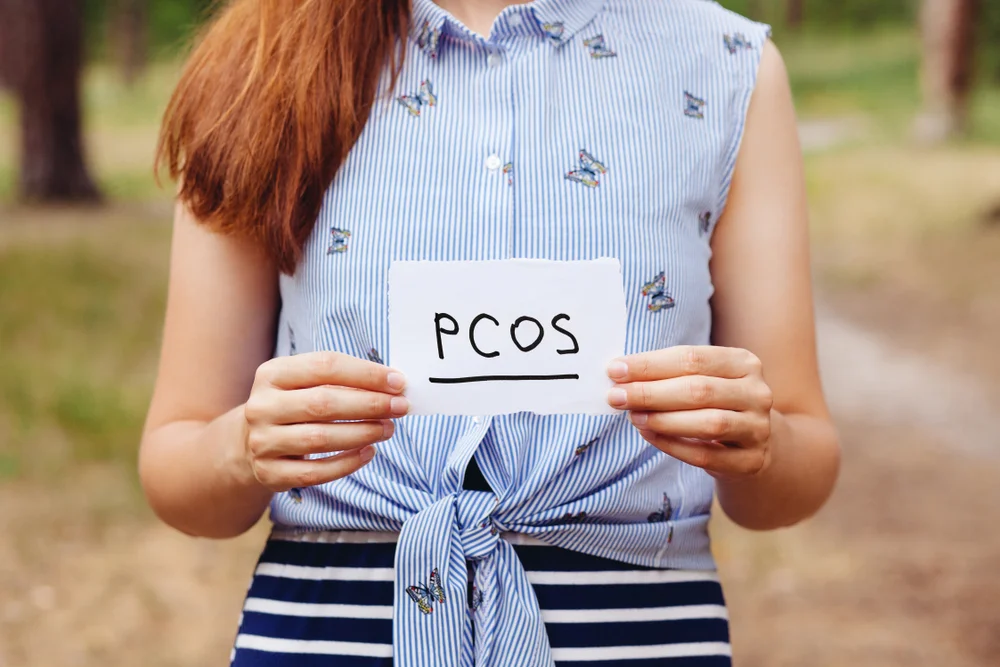Living with Polycystic Ovary Syndrome (PCOS) can be a challenging journey, especially when it comes to managing hormonal imbalances. Among the various hormones affected in PCOS, estrogen plays a crucial role in regulating the menstrual cycle, fertility, and overall well-being. In this blog, we will explore the complexities of PCOS and delve into the world of estrogen treatment as a potential solution. Whether you’re newly diagnosed or seeking additional insights, this guide aims to provide valuable information on understanding, addressing, and managing PCOS through estrogen-focused treatments.
Contents
How PCOS Is Connected To Estrogen?
 Polycystic Ovary Syndrome (PCOS) is a complex endocrine disorder that affects individuals, primarily women, during their reproductive years. While the exact cause of PCOS is not fully understood, there is a strong association between PCOS and hormonal imbalances, including disturbances in estrogen levels. Here’s how PCOS is connected to estrogen:
Polycystic Ovary Syndrome (PCOS) is a complex endocrine disorder that affects individuals, primarily women, during their reproductive years. While the exact cause of PCOS is not fully understood, there is a strong association between PCOS and hormonal imbalances, including disturbances in estrogen levels. Here’s how PCOS is connected to estrogen:
- Estrogen Imbalance
In individuals with PCOS, there is often an imbalance in sex hormones, including estrogen. Estrogen is a key female sex hormone responsible for regulating the menstrual cycle. And, supporting reproductive health, and influencing various physiological processes in the body.
- Anovulation and Irregular Menstrual Cycles
PCOS commonly leads to anovulation, a condition where the ovaries do not regularly release eggs. This disrupts the normal menstrual cycle, and irregular or absent periods are common symptoms of PCOS.
- Follicle Development and Ovulatory Dysfunction
The ovaries in individuals with PCOS often contain multiple small cysts, which are immature follicles that haven’t developed properly. Estrogen is crucial for the development and maturation of these follicles.
- Elevated Androgen Levels
PCOS is also associated with elevated levels of androgens. These are male sex hormones that are present in both males and females. High androgen levels can disrupt the normal balance between estrogen and progesterone. Ultimately, leading to further complications in the menstrual cycle.
- Insulin Resistance and Hyperinsulinemia
Many individuals with PCOS experience insulin resistance, where the body’s cells have a reduced response to insulin. This condition can lead to elevated insulin levels (hyperinsulinemia). This, in turn, can stimulate the ovaries to produce more androgens.
Understanding the connection between PCOS and estrogen is crucial for developing effective treatment strategies. Consulting with a healthcare professional is essential for accurate diagnosis and tailored management of PCOS-related estrogen imbalances.
What Are Some Best PCOS Estrogen Treatment?
PCOS estrogen treatment often involves addressing hormonal imbalances. Estrogen-focused treatments aim to regulate the menstrual cycle, manage symptoms, and improve overall reproductive and metabolic health. Here are some common PCOS estrogen treatment options:
Combined Oral Contraceptives (COCs)
Combined oral contraceptives (COCs) are a common and effective treatment for PCOS. They contain a combination of estrogen and progestin, hormones that work together to regulate the menstrual cycle. COCs help suppress the overproduction of androgens, leading to a reduction in symptoms such as acne and hirsutism. By regulating menstrual cycles, COCs also contribute to the prevention of endometrial hyperplasia, a condition associated with irregular or absent periods. Additionally, COCs provide contraceptive benefits, which can be particularly useful for individuals not planning a pregnancy.
Progestin-Only Contraceptives
Progestin-only contraceptives offer an alternative for individuals who cannot or prefer not to use estrogen-containing medications. Mini-pills, progestin-containing intrauterine devices (IUDs), and contraceptive injections are examples of progestin-only options. While these contraceptives may not regulate menstrual cycles as consistently as COCs, they provide contraceptive benefits and can be well-tolerated by individuals with specific health concerns. Such as a history of blood clots or migraines triggered by estrogen-containing medications.
Hormone Replacement Therapy (HRT)
 Hormone replacement therapy (HRT) is typically considered for postmenopausal women with PCOS or those experiencing premature ovarian insufficiency. HRT involves the administration of estrogen, sometimes combined with progestin, to alleviate symptoms associated with estrogen deficiency, such as hot flashes and bone density loss. It’s important to tailor HRT to the individual’s needs, considering factors like age, health status, and personal preferences. Regular monitoring and adjustments to the hormone dosage may be necessary to optimize the benefits.
Hormone replacement therapy (HRT) is typically considered for postmenopausal women with PCOS or those experiencing premature ovarian insufficiency. HRT involves the administration of estrogen, sometimes combined with progestin, to alleviate symptoms associated with estrogen deficiency, such as hot flashes and bone density loss. It’s important to tailor HRT to the individual’s needs, considering factors like age, health status, and personal preferences. Regular monitoring and adjustments to the hormone dosage may be necessary to optimize the benefits.
Anti-Androgen Medications
Anti-androgen medications, such as spironolactone, target elevated androgen levels in individuals with PCOS. By blocking the effects of androgens, these medications can help reduce symptoms like acne and hirsutism. Spironolactone, in particular, is known for its anti-androgenic properties and is commonly prescribed to address the cosmetic concerns associated with elevated androgens. It’s crucial to discuss potential side effects and contraindications.
Clomiphene Citrate
Clomiphene citrate is a medication used to induce ovulation in women with PCOS who are trying to conceive. It works by stimulating the release of follicle-stimulating hormone (FSH), which, in turn, promotes the development and release of eggs from the ovaries. Clomiphene citrate is often considered a first-line treatment for infertility associated with anovulation in PCOS. Close monitoring and adjustments to the dosage may be necessary to optimize ovulatory response while minimizing the risk of multiple pregnancies.
Metformin
Metformin, a medication commonly used to manage insulin resistance in individuals with type 2 diabetes, is sometimes prescribed for women with PCOS. By improving insulin sensitivity, metformin helps reduce insulin levels and, in turn, may contribute to a more favorable hormonal balance. It can be especially beneficial for individuals with PCOS who have insulin resistance. And, helping to regulate menstrual cycles and improve ovulatory function. Regular monitoring of blood glucose levels and potential side effects is essential when using metformin. Also, its use should be discussed with a healthcare professional.
Regular Monitoring and Adjustments
The management of PCOS, including estrogen-focused treatments, requires regular monitoring and adjustments to the treatment plan. Healthcare professionals will assess the individual’s response to medications, observe changes in symptoms, and make necessary modifications to optimize treatment efficacy. This may involve adjusting hormone dosages, trying different medications, or incorporating lifestyle changes based on the individual’s progress and health goals.
Managing PCOS goes beyond medical interventions, and psychosocial support is integral to the overall well-being of individuals with the condition. PCOS can impact mental health, self-esteem, and body image. Seeking support from healthcare professionals, support groups, or mental health counselors can provide valuable assistance in coping with the emotional and psychological aspects of PCOS. Addressing stressors and cultivating a positive mindset are important components of a holistic approach to PCOS management.
Fertility Considerations
For individuals with PCOS who are planning to conceive, fertility considerations are paramount. In addition to medications like clomiphene citrate, fertility specialists may recommend assisted reproductive technologies (ART) such as in vitro fertilization (IVF) or intrauterine insemination (IUI) to enhance the chances of successful conception. Close collaboration with a fertility specialist ensures that the chosen interventions align with the individual’s reproductive goals and optimize the chances of achieving a healthy pregnancy.
Individuals with PCOS must consult with a healthcare professional before starting any treatment regimen. The choice of treatment depends on various factors, including the severity of symptoms, reproductive goals, and overall health. A comprehensive approach that addresses both hormonal imbalances and other aspects of PCOS.
How Can I Increase My Estrogen Levels Naturally?
 Increasing estrogen levels naturally involves adopting lifestyle changes and dietary habits that support hormonal balance. It’s essential to note that while these strategies may help promote overall hormonal health, they should be approached with caution. Here are some general tips to support natural estrogen levels:
Increasing estrogen levels naturally involves adopting lifestyle changes and dietary habits that support hormonal balance. It’s essential to note that while these strategies may help promote overall hormonal health, they should be approached with caution. Here are some general tips to support natural estrogen levels:
- Phytoestrogen-Rich Foods
Some foods contain compounds called phytoestrogens, which have a chemical structure similar to estrogen. Including moderate amounts of foods like soy products, flaxseeds, sesame seeds, and legumes in your diet may help support natural estrogen levels.
- Healthy Fats
Omega-3 fatty acids, found in fatty fish (like salmon), walnuts, and flaxseeds, play a role in hormone production. Incorporating these healthy fats into your diet can contribute to overall hormonal balance.
- Regular Exercise
Engage in regular physical activity, as exercise has been shown to improve insulin sensitivity and support hormonal balance. Both aerobic exercise and strength training can be beneficial.
- Maintain a Healthy Weight
Achieving and maintaining a healthy weight is crucial for hormonal balance. Excess body fat, especially around the abdomen, can contribute to hormonal imbalances, including elevated estrogen levels. Focus on a balanced diet and regular exercise to support weight management.
- Adequate Sleep
Ensure you get enough quality sleep each night. Lack of sleep or poor sleep quality can disrupt hormonal balance, including estrogen production.
- Avoid Environmental Estrogen-like Compounds
Limit exposure to endocrine-disrupting chemicals that mimic estrogen in the body. This includes minimizing the use of plastic containers, choosing organic produce when possible, and being mindful of personal care products that may contain hormone-disrupting chemicals.
- Vitamin D
Adequate vitamin D levels are important for overall health, including hormonal balance. Spend time outdoors for natural sunlight exposure, and consider vitamin D supplementation if necessary.
- Herbal Supplements
Some herbal supplements, such as black cohosh and red clover, are believed to have estrogen-like effects. However, the evidence of their effectiveness is mixed. And it’s essential to consult with a healthcare professional before using herbal supplements.
Remember that individual responses to these strategies may vary. Hence, it’s crucial to approach any changes with guidance from a healthcare professional. Hormonal balance is intricate, and natural approaches should be part of an overall healthy lifestyle rather than a substitute.
Conclusion
In conclusion, PCOS estrogen treatment involves a combination of medical interventions, lifestyle adjustments, and psychosocial support. From birth control pills to anti-androgen medications and fertility considerations, each approach is tailored to address specific symptoms and individual health goals. Embracing a balanced diet, regular exercise, and stress management contributes to overall hormonal health. Additionally, natural supplements and mindful choices can play a supportive role.
Regular communication with healthcare professionals creates a holistic strategy for navigating the complexities of PCOS and its impact on estrogen levels. Remember, every PCOS journey is unique. So, finding the right combination of treatments requires collaboration with healthcare providers. If you are facing PCOS-related issues, PCOS treatment at HerMantra can help. Book your free trial online pcos treatment session now.


